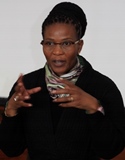
Gender transformation in South Africa today is largely about playing the numbers game to achieve ‘50/50’ – the popular reference to gender equity targets.
In reality, conservative, reactionary attitudes continue to govern gender relationships in both the public and private domains.
The Women’s Day Igqugula Labafazi (Critical Roundtable) at Rhodes University on August 9, hosted by the Women’s Academic Solidarity Association (WASA), fittingly took place in the University’s Council Chambers – seen as the “seat of white male dominance and governance” at Rhodes for over 100 years.
The WASA Roundtable programme titled Beyond the 50/50 Ideal: Gender, Political Culture, and University Transformation set out to:
Unmask the deeply entrenched masculinisation of South African culture that is often hidden behind the ‘50/50’ ideal; and
Offer new vigour, analysis and activism to gender equality and transformation in South African society and higher education institutions.
It featured presentations from a powerful lineup of South African women academics, and announced a book to be published next year titled Mini Skirts and Full Panties: Limits to Gender Transformation in South African Public Culture.
“Today, black women who could once only imagine themselves as maids, teachers or nurses are rising to become scholars who are leading South African universities into the future,” commented WASA co-Chair Siphokazi Magadla, a PhD student and lecturer in the Rhodes Politics Department, and one of the speakers at the Roundtable.
“This future is still a way off, but it is up to the new generation of women postgraduates and academics to drive tangible change in the University’s culture and to help transform the University and academic environment into one that truly reflects the de-racialised, de-genderised, egalitarian space we desire it to be.”
WASA co-Chair Mathe Maema, a PhD student in the Computer Science Department at Rhodes University who chaired one of the Roundtable sessions, added:
“We are in a new era of growth for women postgraduates and academics and we need to address antiquated perceptions and bring in a new energy that encourages women to feel they have a place, a voice and a future in academia, and that the University is their home.”
The keynote speaker was Nomboniso Gasa, a researcher, analyst and public speaker on gender politics, leadership and culture.
She said: “We live in a society that emphasises the glorious liberation achievements and acts of courage and bravery in the pursuit of freedom, yet we fail to look at the blind spots.
“We fail to confront the reality that South African women and women all over Africa continue to be violated and unrecognised in so-called liberated societies.”
Adding to Gasa’s comments, Lwando Scott a Sociology PhD student and lecturer at the University of Cape Town said: “We need to take gender discrimination as seriously as we took apartheid and to develop a Gender Consciousness in the same way that we developed a Black Consciousness.
“The necessity for this becomes all the more apparent if you think about the challenge of even thinking about gender in the vernacular. How do we say ‘the social construction of gender’ in isiXhosa. And how do we say ‘hegemonic masculinity’? Let’s take it from there.”
NOTE: WASA was established at Rhodes University in 2004, and is geared towards strengthening and empowering women academics and postgraduate scholars to further their studies and advance their careers at Rhodes and other academic institutions in South Africa.
Photo by Stephen Penney
